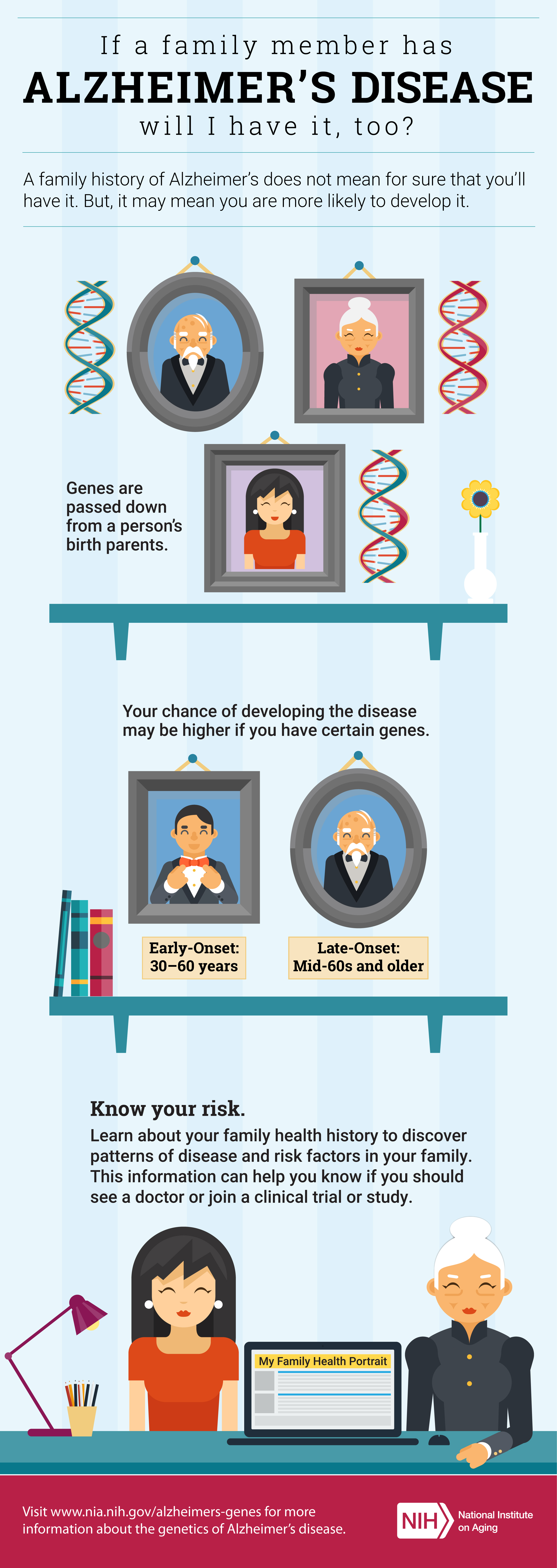
11 Myths About Alzheimer's Disease
1. Alzheimer’s disease and dementia are the same thing
People often use the terms Alzheimer’s disease and dementia interchangeably, but there is a difference. Dementia refers to impaired memory, thinking, reasoning, and behavior, and Alzheimer’s is just one type of dementia. The terms are likely confused because Alzheimer’s is the most common cause of dementia and the most well-known. But there are other types of dementia, too, including Lewy body dementia, frontotemporal dementia, and vascular dementia.
Learn more about dementia and Alzheimer’s disease.
2. I will develop Alzheimer’s disease if my parent has it
If a parent or close relative has Alzheimer’s disease, you may be worried about developing it as you get older. A person’s chance of developing Alzheimer’s is higher if they have certain genetic variants that can be passed down from a parent. However, just because a biological parent has Alzheimer’s does not mean that their children will develop it.
Alzheimer’s disease is complex, and scientists don’t yet fully understand what causes it in most people. Research suggests that in most individuals, a host of factors beyond genetics play a role in the development and course of the disease. Environmental and lifestyle factors, such as exercise, diet, exposure to pollutants, and smoking may also affect a person’s risk for Alzheimer’s. Although we don’t yet know how to prevent Alzheimer’s, it’s important to practice healthy behaviors throughout your lifetime, such as exercising regularly and eating a balanced diet.
Learn more about Alzheimer’s disease genetics.
3. Only people in their 70s and older get Alzheimer’s disease
While the greatest known risk factor for Alzheimer’s is age, that does not mean that only older adults develop it. For most people with Alzheimer’s, it’s true that symptoms first appear in their mid-60s or beyond. However, some people experience symptoms earlier, even as young as their 30s. When a person develops Alzheimer’s between their 30s and mid-60s, it’s called early-onset Alzheimer’s. Early-onset Alzheimer’s is rare — representing less than 10% of people with Alzheimer’s. Developing Alzheimer’s earlier in life can present specific challenges. People diagnosed at younger ages may be more likely to be raising children who are still at home or managing work and having to apply for disability than those who are diagnosed at older ages.
Many people with Down syndrome, a genetic condition, will also develop Alzheimer’s at an earlier age and may begin to show symptoms in their 40s.
Learn more about the causes of Alzheimer’s disease.
4. Alzheimer’s disease symptoms are normal as we get older
Many people become more forgetful as they age, and some forgetfulness, such as losing things from time to time, is normal. However, common signs and symptoms of Alzheimer’s, such as making poor judgments and decisions a lot of the time, having problems recognizing friends and family, or losing track of the date or time of year are not a normal part of aging.
If you are worried about your memory or other possible Alzheimer’s symptoms, talk with your doctor. The doctor may ask questions about your health history, perform assessments of your thinking and memory, and carry out medical tests to determine your diagnosis.
Learn more about the signs and symptoms of Alzheimer’s disease.
5. There are no treatments available for people with Alzheimer’s disease
There has been significant progress toward developing better treatments for people with Alzheimer’s. Several medications are available that can help treat people with Alzheimer’s disease. There are also coping strategies to help manage behavioral symptoms.
While there is currently no cure for Alzheimer’s disease, thanks to scientific advances, research has never been more promising. In total, NIA is funding hundreds of clinical trials including both drug and nondrug interventions. These include testing treatments that target behavior and lifestyle factors as well as underlying causes of the disease.
Learn more about how Alzheimer’s disease is treated and where to find Alzheimer’s clinical trials.
6. If I’m frequently forgetting things, it must be Alzheimer’s disease
Even though memory problems are typically one of the first signs of Alzheimer’s, not all memory problems mean a person has the disease. Some forgetfulness is normal as we age.
Talk with your doctor to determine whether the memory changes you’re noticing are normal or may be a sign of something more serious. In some cases, depression or medication side effects can cause memory and other thinking problems. With treatment, it may be possible to reverse some memory problems due to these reasons.
Learn more about what’s normal memory loss and what’s not.
7. You can buy supplements online to prevent or cure Alzheimer’s disease
There are many websites and advertisements that promise certain supplements can effectively treat or cure diseases such as Alzheimer’s. In some cases, these may seem reliable, offering advice on healthy aging and Alzheimer's to gain people’s trust and promote their products. However, there is no scientific evidence backing these claims, and currently, no supplement has been proven to delay, prevent, treat, or cure Alzheimer’s.
Talk with your doctor before taking any supplements or trying any other new treatments.
Find tips to help determine whether an online health information article is reliable.
8. You can prevent Alzheimer’s disease
There is no proven way to prevent Alzheimer’s. However, there are steps you can take to help reduce your risk for this disease. A risk factor is something that may increase a person’s chance of developing a disease. Some risk factors can be controlled, while others, such as the genes you inherit, cannot.
In general, leading a healthy lifestyle may help reduce risk factors that have been associated with Alzheimer’s and other age-related health problems. These include:
- Controlling high blood pressure
- Maintaining a healthy weight
- Staying mentally and physically active
- Preventing head injury
- Sleeping seven to nine hours each night
Learn more about reducing your risk for Alzheimer’s disease and what we know about preventing Alzheimer’s.
9. Doctors cannot definitively diagnose someone with Alzheimer’s disease until after death
Before researchers developed biomarker tests in the early 2000s, the only sure way to know whether a person had Alzheimer’s disease was through autopsy, a procedure that is performed after death. Now, lab and imaging tests are available to help a doctor or researcher see the biological signs of the disease in a living person. For example, it is now possible for doctors to order a blood test to measure levels of beta-amyloid, a protein that accumulates abnormally in people with Alzheimer’s. Several other blood tests are in development. However, the availability of these tests is still limited. NIA-supported research teams continue to study options for faster, less-expensive, and less-invasive ways to diagnose Alzheimer’s.
Learn more about biomarkers and Alzheimer’s detection and research.
10. An at-home genetic test can tell me if I have (or will have) Alzheimer’s disease
You may have heard about at-home genetic tests. These tests extract DNA from a person’s saliva and provide reports of the genetic data. It’s important to note that no genetic test can diagnose Alzheimer’s disease. Genetic tests can identify certain rare genetic variants that cause early-onset Alzheimer’s, as well as genetic variants that increase a person’s risk for the disease. FDA has approved one of these tests for at-home use. This test shows if a person carries a form of the APOE gene, APOE ε4. People with this variant are at an increased risk for Alzheimer’s, but it does not mean that they will definitely develop the disease.
Talk with your doctor about these types of genetic tests. You also may want to schedule an appointment with a genetic counselor to help you consider whether a test is right for you and to understand the results.
Learn more about Alzheimer’s disease genetics.
11. I’m not a scientist. I can’t do anything to help fight Alzheimer’s disease
Even if you are not a scientist, there are many ways that you can help advance Alzheimer’s disease research! Volunteers participating in clinical trials and studies have led to meaningful advancements in the detection, diagnosis, and treatment of Alzheimer’s. By joining a trial or study, you become a partner in helping researchers advance their knowledge toward effective diagnostics, treatments, and preventions. All types of volunteers are needed, including people living with dementia, caregivers, and healthy volunteers.
As a family member or friend of a person living with Alzheimer’s, you can also help by offering support, such as learning tips for communication or finding suitable activities. You can also offer help by supporting caregivers of people with Alzheimer’s or a related dementia.
Learn more about participating in Alzheimer’s disease research and where to find a clinical trial.
Source: National Institute on Aging


